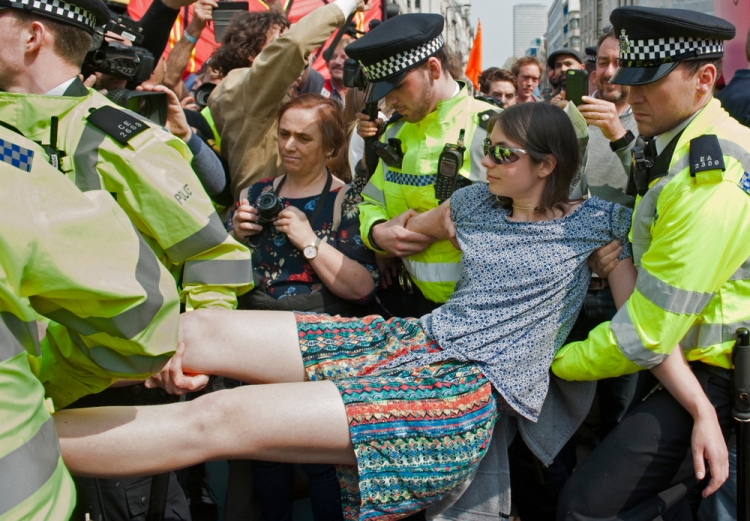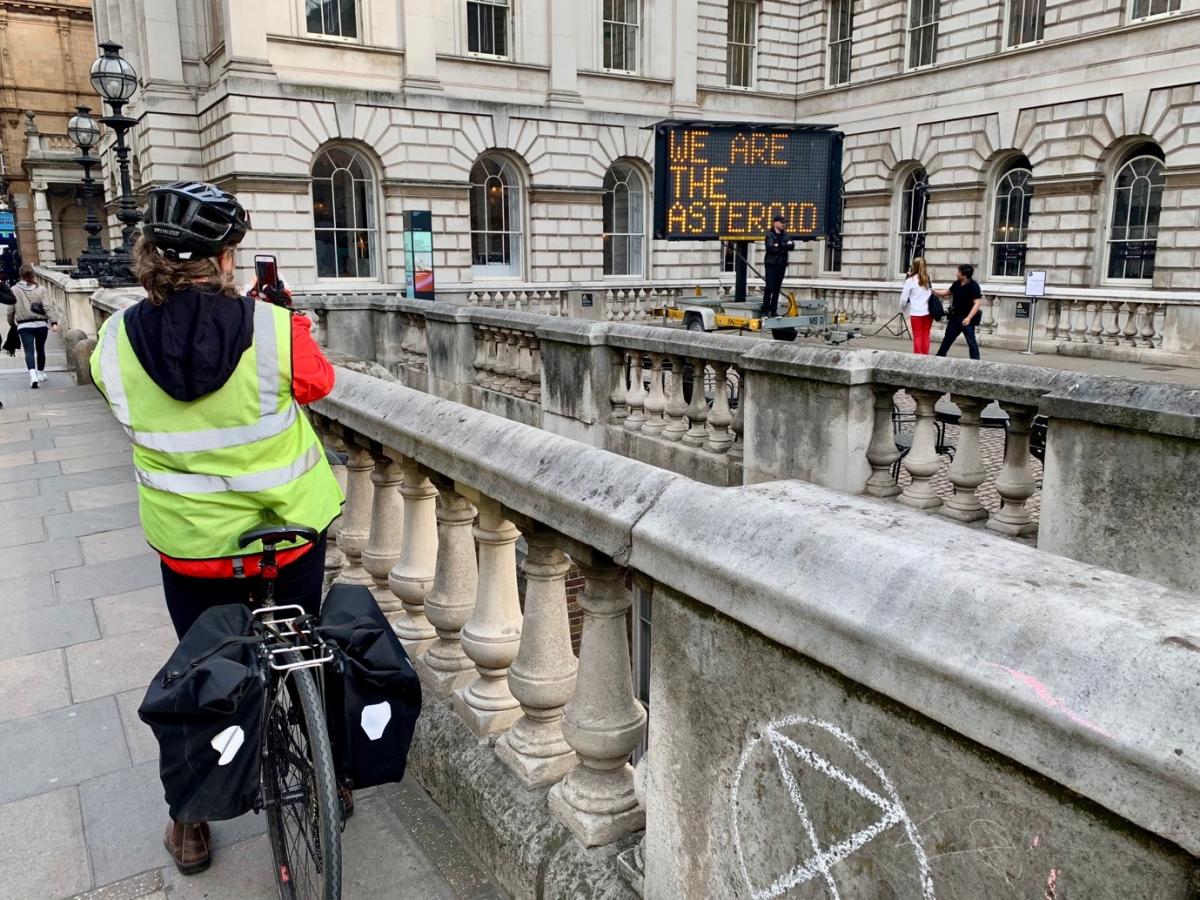As political leaders give in to a key demand of Extinction Rebellion, John Elkington of Volans explains how a platform of business leaders is now supporting the climate activist group
Scotland and Wales have both now declared a climate emergency, as called for by Extinction Rebellion activists. And on 1 May, MPs in the British Parliament approved a motion to declare an environmental and climate emergency. Who knows where all of this will end up in volatile political times, but the direction of travel is clear. The next big question is what business and financial markets will do in response.
It is a question the Volans team has been wrestling with since the protests kicked off. Defence lawyers are advised not get too close to their clients, however innocent they may think they are. No doubt there are similar injunctions for sustainability professionals, too? If so, I have often ignored them. Seeing activists as leading indicators of wider changes in society, I have worked for decades to bring them into closer contact with corporate top teams and boards.
In doing so, as a public health warning to clients, I have generally insisted that if it ever came to the crunch we would probably side with the activists – not because they are invariably right, but because they often represent historic inevitabilities that are otherwise too easy to ignore. Some people may conclude that I have emulated General Montgomery’s “bridge too far” syndrome when it comes to Extinction Rebellion. I don’t agree, and here’s why.
Since Volans moved into Somerset House in January, Waterloo Bridge is literally on our front doorstep
Late last year, Ethical Corporation kindly invited me to forecast what 2019 might hold. My top tip was that readers should expect to see more of Extinction Rebellion. Indeed we have. And very close to home, too. XR, as it is sometimes abbreviated, brought London's Waterloo Bridge to a standstill for over a week. And, since Volans moved into Somerset House in January, Waterloo Bridge is literally on our front doorstep.
I had a fair few opportunities to speak to our new neighbours and get a sense of who and what they were. To say I was impressed would be an understatement. Yes, I heard one passer-by call the protestors “terrorists”, and a couple of other impolite remarks made by idlers who looked as if they were signed-up members of the idiocy liberation front. But the protestors themselves were polite, thoughtful and engaging; people who were no longer willing to to let the world go to ruin around them, and were prepared to go to prison, if that’s what it took.
.
The mood was infectiously cheerful and the police presence restrained and, on occasion, playful. Some people clearly disapproved, but at a time when politics in general is suffering the biggest trust deficit in memory, this was exactly what was needed.
XR got what it wanted, including more than their declared intent of 1,000 arrests, and the resulting media coverage was amazingly positive, including a wonderfully positive cover story in the Financial Times Weekend Magazine just before the whole thing kicked off.
The costs the protests have imposed are regrettable but future costs imposed by the climate emergency will be many orders of magnitude greater
I wasn’t greatly surprised, to be honest, having invited XR co-founder Gail Bradbrook into our office some weeks before the protests, and having been forcefully impressed both by her and by XR’s theory of change.
And that was it, until I got a fairly urgent request to join a small group working to protect XR’s political flanks against growing criticism from those who argued that the protestors were causing multi-million-pound damage to the London economy. We came up with the arch-traditional idea of an XR-friendly letter from business people to The Times.
Although the letter was my idea, I was not at all confident that we would get signatories, particularly since we were inviting them over the Easter weekend. In the event, though, we received over 20 signatures, with further offers continuing to come in after the letter was published. Alongside an article with the headline “Business leaders voice support for climate activists who shut down capital”, it appeared in The Times on 22 April.

The letter began by saying: "Sir, Contrary to belief, there is business support for the Extinction Rebellion (XR) agenda. The multi-million-pound costs that the Extinction Rebellion protests have imposed on business are regrettable, as is the inconvenience to Londoners. But future costs imposed on our economies by the climate emergency will be many orders of magnitude greater."
It continued to say: "Most businesses were not designed in the context of the developing climate emergency. Hence we must urgently redesign entire industries and businesses, using science-based targets. To kick start the process, businesses should make a declaration that we face a climate emergency and organise a session at a full board meeting to consider the case for urgent action. We will encourage the senior management teams of which we are part to do likewise."
As benchmarks of serious intent, the five principles should help at least some corporate boards navigate towards declaring a climate emergency
For updates, sign up here. But one question that has been dangling since the outset is whether it might also be a good idea to bring together XR experts and activists with business people? Whoever does this, and however it is done, the nature and scale of that challenge became a good deal clearer for anyone who read Professor Jem Bendell’s open letter here, itself a response to our letter in The Times.
His five recommended themes for any business embrace of the climate emergency agenda run as follows. First, he wants business to say “we failed”. Second, “we were wrong” in believing that markets alone could solve the problems. Third, “we will learn” from others. Fourth, citizens need more influence than business. And, fifth, business “must be made to behave.” He explains: “Praising individual companies doing useful things was never enough. We need state intervention to redesign the economy so we can more swiftly decarbonise and also prepare for the disruptions ahead. That means corporate support for changes in the law, perhaps even introducing a law on ecocide by corporations.”
Bendell’s five asks set out in the letter will make a good deal of sense to any self-respecting system-change activist, but there is no way in the world that major corporations will sign up to that agenda. I can already hear lawyers hyperventilating about the risk of any admission of responsibility. We know that several of our signatories had to check with lawyers before signing, with a couple of changes made in the text of the letter as a result.

Still, as benchmarks of serious intent, the five principles should help at least some corporate boards navigate towards that first crucial step of declaring a climate emergency. The fact that Scotland’s First Minister, Nicola Sturgeon, promptly did precisely that helped the concept gain political traction in some quarters, but the oil and gas industry must be wondering whether this signals a coming clampdown on the country’s fossil fuels sector. With Sturgeon herself talking in terms of another independence referendum, it is hard to see how this might play out to everyone’s satisfaction.
Meanwhile, three things have struck me forcefully about XR. First, the movement has bridged the generations, in the process pulling in people with no previous experience in activism. Second, the general public broadly sympathised with the protests, with a much better sense today of the growing climate emergency. And, third, while a decade or two ago many protestors would have called for the extinction of capitalism, the demands this time were often more nuanced – and therefore harder to dismiss out of hand.
Yes, there are anti-capitalists in the movement. Nor should we be surprised at a time when even some capitalists are starting to question the longer-term viability of capitalism. At the same time, the best of them are considering how to shift to a regenerative economic model, something we are covering in our ongoing Tomorrow’s Capitalism Inquiry.
For most people, meanwhile, even within the XR movement, there seems to be a recognition that getting at least some business and financial market leaders on board is now a critical next step towards longer-term system change. That strikes me as encouraging, and something we should now put our collective weight behind. So how long before you ask your own board to urgently consider the political, social and commercial implications of the climate emergency?

John Elkington has been described as the “godfather of sustainability”. He was recognised with a Lifetime Achievement Award in Ethical Corporation's Responsible Business Awards in 2015. He has co-founded four companies, including Volans Ventures, where he is chairman and chief pollinator. He is the author of 19 books and has served as a member of over 70 boards and advisory boards
Volans Extinction Rebellion Gail Bradbrook Responsible Business Jem Bendell


